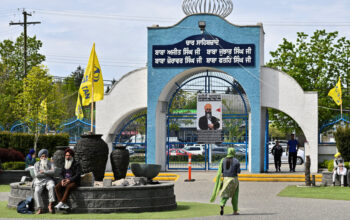
Eugenio Scalfari, one of Italy’s best-known journalists, who came to enduring prominence as a founder of the liberal newspaper La Repubblica, lobbing editorial salvos across the nation’s public life and over the high walls of the Vatican, died on Thursday in Rome. He was 98.
His death was announced by La Repubblica.
For two decades as La Repubblica’s top editor, Mr. Scalfari oversaw investigative reporting packaged in a tabloid format that critics said matched the nation’s thirst for what Italians call “dietrologia,” the secretive stories deemed to propel civic events and traded over dinner tables and during the ritual evening promenade around the piazzas. After his tenure as editor ended in 1996, he remained affiliated with La Repubblica as a columnist.
Such was Mr. Scalfari’s prominence that, when his death became public knowledge, lawmakers interrupted a formal debate to hold a minute’s silence in his honor. Tributes poured in from friends and foes alike.
One of those tributes came from Silvio Berlusconi, the onetime prime minister and media mogul whom Mr. Scalfari had accused of creating huge conflicts of interest between his ascent to high office and his labyrinthine business empire.
“Eugenio Scalfari was a point of reference for my political enemies,” Mr. Berlusconi said on Twitter. “Today, however, I cannot but acknowledge that he was a great publisher and journalist whom I always appreciated for his dedication and passion for his work.”
And on Thursday, even in the midst of a bruising political crisis, Prime Minister Mario Draghi described editorials written by Mr. Scalfari as “fundamental reading for whoever wished to comprehend politics and the economy.”
In his later years Mr. Scalfari, an atheist, embarked on a series of discussions with Pope Francis, whom he called a “revolutionary,” and produced sensational accounts of those discussions that the Vatican sometimes disavowed. He did not take notes or use recording devices, so his articles relied on his memory of the encounters for their claimed — and often disputed — veracity.
In 2018, for instance, Mr. Scalfari asserted in an article for La Repubblica that the pope had told him that hell did not exist, contradicting Catholic dogma. He said he and Pope Francis had discussed the question of where “bad souls” go after death, and the manner of their punishment.
The pope, he said, had replied: “They are not punished. Those who repent obtain God’s forgiveness and take their place among the ranks of those who contemplate him, but those who do not repent and cannot be forgiven disappear. A hell does not exist; the disappearing of sinning souls exists.”
The Vatican responded by saying that Mr. Scalfari’s article was “the fruit of his reconstruction” and did not represent a “faithful transcription of the Holy Father’s words.”
On Thursday, a Vatican spokesman, Matteo Bruni, said the pope had learned “with sorrow of the passing of his friend” and “cherishes with affection the memory of the meetings — and the deep questions on the ultimate questions of humankind — that he had had with him over the years.”
Longtime readers said the tabloid format and combative headlines of La Repubblica, founded in 1976, introduced a new style of journalism suited to an era of change in Italian public life that loosened the hold of its traditional postwar political parties amid a welter of corruption scandals. Ezio Mauro, who succeeded Mr. Scalfari as editor in 1996, said he “revolutionized the mode of being of Italian journalism.”
La Repubblica became the country’s second-largest newspaper after Corriere della Sera — and briefly, in December 1986, the top seller. In the 1990s it vied with rivals to chronicle a series of kickback investigations known as “mani pulite” (“clean hands”), which discredited much of the postwar political elite.
In his youth, according to La Repubblica, Mr. Scalfari had shared the enthusiasms of many young people drawn to the imperial Roman mythology of Italian Fascism under Benito Mussolini. But, during World War II, he was repudiated by his fellow Fascists after writing a critical article and veered to the left.
Many years later, when extreme right-wing figures seemed to be re-emerging in the Berlusconi era, he disputed the notion that Fascism could be revived in Italy. “Fascism is unthinkable in Italy today,” he told the British newspaper The Independent in 1994. In Italy, he said, the hard right itself was “not a danger to democracy.”
“But,” he added, “they could provoke social tensions so bitter that they could create a situation of risk.”
Eugenio Scalfari was born on April 6, 1924, in Civitavecchia, a port city north of Rome. In his infancy, his family moved to Sanremo, near the French border, where he began a lifelong friendship with the Italian author Italo Calvino, a classmate.
He was married twice, the first time, in 1950, to Simonetta de Benedetti, who died in 2006 and with whom he had two daughters, Enrica and Donata Scalfari. His second wife was Serena Rossetti. Information on survivors was not immediately available.
In the immediate postwar era, Mr. Scalfari studied law and wrote for prominent magazines including Il Mondo and L’Europeo. He co-founded the magazine L’Espresso in 1955 and became its top editor in 1963.
In 1967, L’Espresso secured a major scoop by disclosing an attempted coup in 1964 by an Italian general.
The owners of L’Espresso and others set up La Repubblica in 1976, with Mr. Scalfari as editor in chief.
In the pre-internet era, Italy’s ubiquitous newsstands bulged with rival publications jostling for a slice of the national readership. As was the case in other countries, many of them were linked to large companies or political parties, including the Italian Communist Party, once known as the largest such group in the West.
Under Mr. Scalfari, La Repubblica argued that Italians should embark on a reappraisal of the Communist Party, which was long supported by the Soviet Union and was finally dissolved in 1991.
While many publications took partisan positions in Italy’s rough-and-tumble politics, Mr. Scalfari also played a more direct role, serving as a lawmaker aligned with the Socialist Party from 1968 to 1972. In 1955, he had been among the founders of the smaller Radical Party.
His time as a journalist coincided with some of the most turbulent and bloodstained days of Italy’s postwar history, marked by left-wing and right-wing political violence and by the perennial battle with organized crime, including the Sicilian Mafia.


